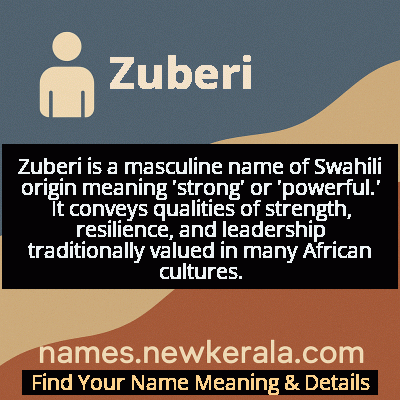Zuberi Name Meaning & Details
Origin, Popularity, Numerology Analysis & Name Meaning of Zuberi
Discover the origin, meaning, and cultural significance of the name ZUBERI. Delve into its historical roots and explore the lasting impact it has had on communities and traditions.
Name
Zuberi
Gender
Male
Origin
Egyptian
Lucky Number
9
Meaning of the Name - Zuberi
Zuberi is a masculine name of Swahili origin meaning 'strong' or 'powerful.' It conveys qualities of strength, resilience, and leadership traditionally valued in many African cultures.
Zuberi - Complete Numerology Analysis
Your Numerology Number
Based on Pythagorean Numerology System
Ruling Planet
Mars
Positive Nature
Generous, passionate, energetic, and humanitarian.
Negative Traits
Impulsive, impatient, moody, and can be overly emotional.
Lucky Colours
Red, maroon, scarlet.
Lucky Days
Tuesday.
Lucky Stones
Red coral, garnet.
Harmony Numbers
1, 2, 3, 6.
Best Suited Professions
Military, sports, philanthropy, leadership roles.
What People Like About You
Courage, energy, leadership, generosity.
Famous People Named Zuberi
Zuberi Mwita
Tanzanian politician
Member of Parliament and advocate for community development
Zuberi Kurewa
Theologian and educator
Significant contributions to African theological education and church leadership
Zuberi S. D. Mwita
Academic researcher
Published works on African development and social sciences
Name Variations & International Equivalents
Click on blue names to explore their detailed meanings. Gray names with will be available soon.
Cultural & Historical Significance
The name's connection to Arabic origins through 'Zubair' links it to Islamic history, as Zubair ibn al-Awwam was a prominent companion of the Prophet Muhammad. This dual heritage makes Zuberi a name that bridges African and Islamic cultural traditions, symbolizing both physical strength and spiritual fortitude. In many communities, the name is chosen to bestow qualities of leadership and protection upon the bearer.
Extended Personality Analysis
Individuals named Zuberi are often perceived as natural leaders with strong, determined personalities. They typically exhibit confidence, resilience, and a protective nature toward those they care about. Their strength of character often manifests as reliability and the ability to handle challenging situations with composure. Zuberis are frequently seen as pillars in their communities or families, people others turn to for guidance and support.
Beyond their evident strength, Zuberis often possess deep loyalty and a strong sense of justice. They tend to be principled individuals who stand up for what they believe in and defend those who cannot defend themselves. While they may appear formidable at first, many Zuberis balance their strength with compassion and wisdom, using their power to uplift rather than dominate others. Their combination of physical or emotional strength with moral integrity makes them respected figures in various social contexts.
Modern Usage & Popularity
In contemporary times, Zuberi remains a popular name in East African countries, particularly Tanzania and Kenya, where it maintains its cultural significance while adapting to modern contexts. The name has seen some international spread through diaspora communities, with parents choosing it to honor African heritage and convey strength. While not among the most common names globally, it has maintained steady usage and is increasingly recognized in multicultural societies. Recent years have shown a slight uptick in its usage as parents seek meaningful names with cultural depth and positive associations.
Symbolic & Spiritual Meanings
Symbolically, Zuberi represents more than just physical strength—it embodies the concept of inner fortitude, resilience in adversity, and the power to protect and provide. The name carries connotations of being an anchor or foundation, someone who remains steadfast when others might falter. In metaphorical terms, Zuberi symbolizes the strength of ancient baobab trees—deeply rooted, enduring through seasons, and providing shelter and sustenance to others. It also represents the strength of flowing rivers that persist in carving their path while nourishing the land through which they travel.

